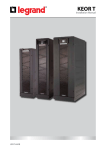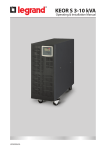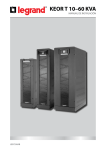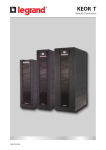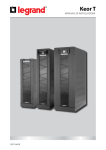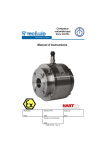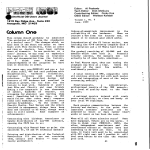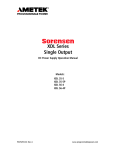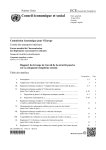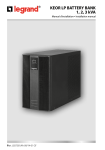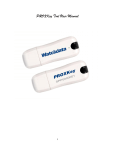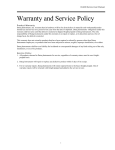Download Keor T 80-120 kVA
Transcript
Keor T 80-120 kVA Installation Manual LE08373AA Keor T EN 2 ENGLISH 6 Installation Manual Keor T Important Notices! Thank you for choosing LEGRAND UPS System to supply your Critical Application. This manual contains important information about commissioning, usage and technical properties of the UPS. It also contains safety information for operator and instructions to secure your critical load. Applying the recommendation detailed in this manual is necessary to use UPS safely and correctly. Read the manual completely before working on this equipment! Keep this manual in UPS’s front cover’s pocket for easy consultation! Reproduction, adaptation, or translation of this manual is prohibited without prior written permission of LEGRAND Company, except as allowed under the copyright laws. The manufacturer reserves the rights to change the technical specifications and design without notice. LEGRAND reserves the rights to change the information in this document without notice. Refer to http://ups.legrand.com/ web site to dowload last release and translations. Units that are labelled with a CE mark comply with the Standard: EN 62040-1 and EN 62040-2. 3 Description of the Symbols Used in the Manual This symbol points out the instructions which are especially important. This symbol points out the risk of electric shock if the following instruction is not followed. This symbol points out the instructions, which may result with injury of the operator or damage of the equipment if not followed. All packing material must be recycled in compliance with the laws in force in the country where the system is installed. Description of the Abbreviations Used in the Guide UPS: Uninterruptible Power Supply ESD: Emergency Switching Device RS232: Serial Communication Protocol RS485: Serial Communication Protocol MODBUS: Modicon Communication Protocol SNMP: Simple Network Management Protocol V: Volt A: Ampere P: Power For Mains Supply, Auxiliary Mains Supply, Output, Battery Circuit Breaker and Maintenance Bypass Circuit Breaker; “ON”: Closing the Circuit “OFF”: Opening the Circuit 4 Installation Manual Keor T Battery Fast Fuses Installation & Operating Manuals 5 INDEX 1. FOREWORD 7 1.1. Overview 1.2. Manual 7 7 2. WARRANTY 2.1. Terms of Warranty 2.2. Out of Warranty Terms and Conditions 3. SAFETY 3.1. Description of the Symbols Used on the Labels Applied to the UPS 3.2. Individual Protective Gear 3.3. Important Notice for UPS 3.4. Important Notice for Battery 3.5. Emergency interventions 4. REQUIREMENT 4.1. Transportation 4.2. Placement 4.3. Storage 4.4. Electrical Requisites 5. INSTALLATION 5.1. Models and Dimensions 5.2. Unpacking Procedure 5.3. Installation Procedures and Instructions 5.3.1. Power Connections of Single Systems 5.3.2. Power Connections of Parallel Systems 6. COMMUNICATION 6.1. Serial Communication (RS232) 6.2. Internal SNMP Communication 6.3. Emergency Switching Device and Generator Connections 6.4. Dry Contacts 6.5. RS485 Appendix-1: Technical Specifications Appendix-2: Modbus List Appendix-3: Description of UPS and Block Diagram 6 9 9 9 10 10 10 11 12 12 13 13 13 15 15 18 18 19 20 21 37 39 40 41 42 43 44 45 47 49 Installation Manual Keor T 1. FOREWORD 1.1. Overview Thank you for choosing LEGRAND UPS Keor T product. KEOR T has been designed with advanced technologies and the latest compo¬nents generation; realized to satisfy both users and instal¬lers in their operational needs of high availability and perfor¬mance. This UPS aims to be efficient, functional, safe and very easy to install and use. LEGRAND has studied the best way to reconcile high-tech performance and ease of use, making “user friendly” technologi¬cally advanced products. KEOR T supplies maximum protection and power quality for any type of IT load, tertiary application, lighting or building. Furthermore, standards deployed by Legrand for R&D, supplier selection and manufacturing comply with the highest quality standards. This product is manufactured in an ISO 9001 & ISO14001 certified factory in full compliance with the eco-design laws. The UPS Keor T system is made in compliance with the existing European Community directives and with the technical standards in force to comply with CE marking as certified by the Declaration of Conformity issued by the Manufacturer. Technology & Architecture A special feature of Keor T is Online Double Conversion Operation (VFI-SS-111 as defined by the reference standard EN 62040-3) based on the capacity to supply a voltage that is perfectly stabilized in frequency and amplitude, even in event of extreme alterations of mains power supply. The 3-Level Switching Technology used in this product is the latest solution to provide high energy efficiency even with low load conditions. The energy efficiency performance of Keor T surpasses the minimum requirements defined by the Code of Conduct on Energy efficiency and Quality of European of AC UPS defined by EC. KEOR T represents the best solution combining high performance, low management costs and ease of operation and maintenance: • Dual Input • User friendly touch screen design • UPS via LED bar (with traffic light coding) gives an immediate diagnosis of the system under any conditions. • Internal Battery option as well as wide range external battery cabinets. • Isolation transformer can be mounted inside UPS cabinet upon request. • Integrated Maintenance Bypass • Parallelable to increase the power • Availability of different communication types 1.2. Manual • The purpose of this manual is to provide indications for using the equipment safely and to carry out first level of troubleshooting. • This manual is addressed to persons already educated on precautions to adopt in face of electrical hazard • This manual is addressed to “User“, generic term to identify all persons that will have the need and / or obligation to provide instructions or operate directly this UPS equipment • Adjustments, preventive and curative maintenance jobs are not dealt with in this manual as they are reserved exclusively to skilled and authorized Legrand UPS Technical Service Engineers. • The intended use and configurations envisaged for the equipment are the only ones allowed by the Manufacturer; do not attempt to use the equipment in disagreement with the indications given. Any other use or configuration must be agreed and written by the Manufacturer, in such a case, will be an enclosure to the manual. • For its use the user must also comply with the specific laws in force that exist in the country where the equipment 7 is installed. Reference is also made in this manual to laws, directives, etc., that the user must know and consult in order to fulfil the purposes established by the manual. • If information is exchanged with the Manufacturer or assistance personnel authorized by the former, please refer to the equipment’s rating plate data and serial number. • The manual must be kept for the equipment’s useful life cycle and, if necessary (e.g. damage which prevents it being consulted even partially) the user must ask the Manufacturer for a new copy, quoting the publishing code on the cover. • The manual reflects the state of the art at the moment the equipment was put on the market, of which it is an integral part. The publication complies with the directives in force at such a date. The manual cannot be considered inadequate if updates of standards or changes are made to the equipment. • Any integration to the manual which the Manufacturer deems fitting to send to the users must be kept with the manual, becoming an integral part of it. •, The Manufacturer is available to its clientele to provide additional information and will take into consideration any suggestions made to improve this manual to bring it even closer to the requirements for which it was drawn up. • If the equipment is sold, which always includes handing over this operating manual, the primary user must notify the Manufacturer, giving him the address of the new user so the latter can be reached if there are any communications and/or updates deemed indispensable. Read the manual completely before working on this equipment! Keep this manual in UPS’s front cover’s pocket for easy consultation! Reproduction, adaptation, or translation of this manual is prohibited without prior written permission of LEGRAND Company, except as allowed under the copyright laws. The manufacturer reserves the rights to change the technical specifications and design without notice. LEGRAND reserves the rights to change the information in this document without notice. Refer to http://ups.legrand.com/ web site to dowload last release and translations. Units that are labelled with a CE mark comply with the Standard: EN 62040-1 and EN 62040-2. 8 Installation Manual Keor T 2. WARRANTY 2.1. Terms of Warranty • Warranty is defined by General Conditions of Sale and Delivery. • The UPS including all the internal parts is under the warranty of LEGRAND. • If the UPS malfunctions because of component, manufacturing or installation (if it’s done by authorized LEGRAND UPS Technical Service Personnel) problems during the warranty period, the UPS will be repaired (spares and labour) by the Manufacturer under warranty. 2.2. Out of Warranty Terms and Conditions This Warranty does not apply if: • UPS not commissioned or maintained by an authorized LEGRAND UPS Technical Service staff or an authorized LEGRAND distributor Technical Service staff • UPS not used according the terms of operating and installation manual • Product serial number label has been removed or lost This Warranty does not cover any defects or damages caused by: • Neglect, accident, misuse, misapplication • Failure due to fortuitous circumstances or force majeure (lightning, floods…etc.), • Unloading and transportation damage and failures after delivery, • Damage or injuries caused by negligence, lack of inspection or maintenance, or improper use of the products, • Faulty electrical wiring, • Defects arising either from designs or parts imposed or supplied by the purchaser, • Defects and damage by fire and lightning, • Failures due to modification in the products without LEGRAND approval, • Improper installation, testing, operation, maintenance, repair, alteration, adjustment, or modification of any kind by unauthorized personnel, The Manufacturer will repair the device in such cases for a fee and is not responsible for the shipment of the equipment. The Battery warranty does not apply if the temperature in the room exceeds 25 °C. Extended battery warranty does not apply if: • UPS has not been commissioned • A yearly preventive maintenance visit has not been performed By an authorized LEGRAND UPS Technical Service staff or authorized LEGRAND distributor Technical Service staff. The UPS may contain batteries that should be recharged 24Hours min after 6 month storage duration to avoid deep battery discharge. Warranty cannot apply on batteries that have suffered of deep discharge. 9 3. SAFETY Information related to safety of the UPS, battery, load and the user is summarized below. But the equipment should not be installed before reading the manual completely. 3.1. Description of the Symbols Used on the Labels Applied to the UPS PE: Protective Earth PB: Protective Bonding Danger! High Voltage (Black/Yellow) This symbol points out the instructions, which may result with injury of the operator or damage of the equipment if not obeyed. 3.2. Individual Protective Gear There is a high risk of electrical shock with the equipment as well as a considerable short circuit current. When installing and servicing the equipment it is absolutely forbidden to work without the protective gear mentioned in this paragraph. The personnel who are going to work with the equipment for installation or maintenance jobs must not wear clothes with baggy sleeves or laces, belts, bracelets or other metal items that could be a hazard source. 10 The following indications summarize the protective gear to wear. Accident and spark proof footwear with rubber sole and reinforced toe Use : always Installation Manual Keor T Waterproof rubber gloves Use : always Protective gear Use : always Protective glasses Use : always 3.3. Important Notice for UPS • The equipment may only be installed and commissioned by authorized LEGRAND UPS Technical Service Personnel. • This manual contains important instructions that you should follow during installation and maintenance of the UPS and batteries. Please read all instructions before installing the equipment and save this manual for future reference. • Not obeying the instructions written on this manual which may result with possible injury of the operator or damage of the equipment. • The equipment shall be packed and fixed properly during transportation to avoid fall down and proper equipment should be used for transportation. Never transport in horizontal position. • The UPS must always stands in a vertical position. Make sure that the floor can support the weight of the system. • Connect the PE ground connector before connecting any other cable. • UPS is designed for indoor use. To reduce the risk of fire or electric shock, install this UPS in a temperature and humidity controlled indoor environment, free of conductive contaminants. Ambient temperature must not exceed 40°C (104°F). Do not operate near water or excessive humidity (95% maximum without condensation). • UPS requires 3Ph-N+PE input connection. • Do not connect the output neutral to the protective ground or protective bonding (except the TNC Option). Keor T does not modify the neutral arrangements of the system; the use of an isolation transformer is required should it be necessary to modify the neutral arrangements downstream Keor T. • KEOR T must be protected from voltage surge with devices that are suited to the installation; the mains voltage surge must be limited to 2kV. These protective devices must be sized to take into account all the installation parameters (geographical position whether or not there is a lightning rod, whether or not there are other suppressors in the electrical installation, etc ) • Even when connections removed, residual voltages of capacitors and/or high temperature may exist on connection terminals and inside the UPS. Before working on terminals, check between all the terminals included PE that no hazardous voltages exist. • The connections shall be made with cables of appropriate cross-section in order to prevent the risk of fire. All cables shall be of insulated type and shall not be laid out on the walking path of the persons. • According to IEC 62040-2; this is a product for commercial and industrial application. In the second environment installation restrictions or additional measures may be needed to prevent disturbances. • Contact your local recycling or hazardous waste centre for information on proper disposal of the used battery or UPS. • Make sure that the UPS is not overloaded to provide a higher quality supply to the loads. 11 • In case of an extraordinary situation (damaged body, cabinet or connections, penetration of foreign materials into the body or cabinet etc.) de-energize the UPS immediately and consult to the LEGRAND Technical Assistance Centre. • When used for particular applications such as life support systems or any other application where product failure is likely to cause substantial harms to person, we would advise you to contact LEGRAND UPS to confirm the ability of • Contact your local recycling or hazardous waste center for information on proper disposal of the used battery or UPS. • Make sure that the UPS is not overloaded to provide a higher quality supply to the loads. • In case of an extraordinary situation (damaged body, cabinet or connections, penetration of foreign materials into the body or cabinet etc.) de-energize the UPS immediately and consult to the LEGRAND Technical Assistance Center. • When used for particular applications such as life support systems or any other application where product failure is likely to cause substantial harms to person, we would advise you to contact LEGRAND UPS to confirm the ability of these products to meet the requested level of safety, performance, reliability and compliance with applicable laws, regulations and specifications. 3.4. Important Notice for Battery • The batteries may only be installed and commissioned by authorized LEGRAND UPS Technical Service Personnel. • Make sure that the battery qty is proper for the unit and they are same type and capacity. Otherwise danger of explosion and fire is within the bounds of possibility. • Do not dispose of batteries in a fire. The batteries may explode. • Do not open or mutilate batteries. Released electrolyte is harmful to the skin and eyes. It may be toxic. • In case of electrolyte in contact with skin, immediately wash the contaminated skin with water. • Replaced batteries must be disposed of at authorized battery waste disposal centers. • A battery can present risk of electric shock and high short circuit currents. The following precautions should be observed when working on batteries; • Remove rings, watches, necklaces, bracelets and all metal objects. • Only use tools with insulated handles. • Wear rubbers gloves and a rubber apron when handling batteries. • Do not lay tools or metal parts on top of batteries. • Eye protection should be worn to prevent injury from accidental electrical arcs. • Before a maintenance or repair work on the UPS; • Switch the input, output and battery circuit breakers (Q1, Q2 and F5) to “OFF” position. • If UPS has external batteries; also switch the circuit breakers of the battery cabinet to “OFF” position. • Determine if the battery is inadvertently grounded. If inadvertently grounded; remove source of ground. Contact with any part of a grounded battery can result in electrical shock. • Battery fuses shall only be replaced with the same rating and type which came along with the UPS. 3.5. Emergency interventions The following information is of a general nature. For specific interventions please consult the laws existing in the country where the equipment is installed. First aid interventions If any first aid intervention is required, comply with company rules and traditional procedures. Fire-prevention measures Never use water to extinguish fire but only the extinguishers designed specifically for electronic equipment or battery fires. 12 4. REQUIREMENT 4.1. Transportation Installation Manual Keor T The UPS must be placed and stand in a vertical position throughout the transportation. Use suitable equipment to remove the UPS from the pallet. The equipment shall be packed properly during transportation. Therefore it is recommended to keep the original package for future need. All packing material must be recycled in compliance with the laws in force in the country where the system is installed. 4.2. Placement This product meets the safety requirements for devices to be operated in restricted access locations according to EN 60950-1 safety standard, which states that the owner should guarantee the following: • Access to the equipment can only be gained by service persons or by users who have been instructed about the reasons for the restrictions applied to the location and about any precautions that shall be taken and, • Access is through the use of a tool or lock and key, or other means of security and is controlled by the authority responsible for the location. • UPS is not designed for outdoor application. • The equipment and the batteries should not be exposed to direct sunlight or placed near to a heat source. • Recommended operating temperature and humidity values are listed on the Appendix-1 Technical Specifications. • Avoid dusty environments or areas where dust of conductive or corrosive materials is present. • The connection and the circuit breakers are at the front of UPS. Leave access at the front of the UPS for maintenance. (Refer to Figure.4.2-4) • Air outlets of the UPS are at the front, back and on both sides. Leave access at the front side, back side and from both lateral sides for ventilation and battery replacement. (Refer to Figure.4.2-1, 4.2-2, 4.2-3 and 4.2-4) • Recommended environmental humidity condition is between 20-95% (non-condensing). Environment Requirement Model (kVA) Max. dissipation at full load 80 100 120 (W 3392 4240 5090 (BTU/h) 11576 14470 17370 Storage temperatures -25/+55 °C (-13/131 °F) (15-25 °C for maximum battery life) Working temperature 0/40 °C (32/104 °F) (15-25 °C for maximum battery life) Maximum relative humidity 95% max. without condensation Maximum altitude without derating 1.000 m (3.300 ft) Degree of protection Colour cabinet IP 20 (other IP as option) RAL 7016@enclosure RAL 9005@front door metal Table.1 13 Figure.4.2-2 Figure.4.2-1 Figure.4.2-3 Air conditioning Ventilation Direction of ventilation is front/sides/bottom to up. The room should be equipped with ventilation system or air conditioning to collect warm air from the top of the room and provide cool air at the bottom. Figure.4.2-4 ROOM LAYOUT RECOMMENDATION TABLE A (mm) For 80-100kVA: 800 (for installation) For 120kVA: 1000 (for installation) 14 B (mm) C (mm) 500 0 D (mm) For 80-100kVA: 500 (for ventilation & maintenance) For 120kVA: 500 (for ventilation) Ensure the stability of UPS without internal battery and take necessary precautions. Installation Manual Keor T The UPS should be mounted on a concrete surface and non-combustible surface. In order to profit from optimal ventilation, the side panels must remain in place for UPS with internal battery. Optimal battery life time is reached when battery ambient temperature is kept between 15°C and 25°C. Operating battery at 30°C ambient temperature compared to 20°C will divide by factor 2 battery life time. Room thermal management as specified above is then necessary to avoid battery life time reduction. The Battery warranty does not apply if the temperature in the room exceeds 25°C. 4.3. Storage Please store the UPS in an environment where the temperature is between -250C + 550C, no receipt of direct sunlight, far from the heating, in a dry place. Environmental humidity must be between 20-95% (non-condensing). Recommended storage temperature, humidity and altitude values are listed on the Appendix-1 Technical Specifications section. If the batteries will be stored for longer than 6 months, they shall be charged periodically. Charge period depends on the storage temperature, as shown below: • Every 9 months if the temperature is below 20°C, • Every 6 months if the temperature is between 20°C and 30°C, • Every 3 months if the temperature is between 30°C and 40°C, • Every 2 months if the temperature is over 40°C For long storage duration; please follow up the instructions of installation described in Section 5, start-up UPS described in Section 6 and charge the batteries at least 10 hours. 4.4. Electrical Requisites The installation must comply with national installation regulations. The electrical distribution panels for common mains supply voltage and auxiliary mains supply voltage inputs must have a protection and disconnection system. Disconnection devices used in these panels shall disconnect all line conductors simultaneously. The following table shows the recommended size of common mains supply voltage and auxiliary mains supply voltage input protection devices (thermal, magnetic and differential) and the cable cross-sections for the loads. When dual inputs is used: • Separate Neutral conductor is necessary to be supplied for each input: Common Mains Input and Auxiliary Mains Input •The two inputs should be supplied by the same MV/LV transformer source. If this is not the case, an insulation transformer should be added in the auxiliary mains line upstream the UPS. • Separate protection is necessary for each input line. 15 Installation Parameters Model (kVA) 80 100 120 Phase in/out 3Ph+N+PE / 3Ph+N+PB Rated output apparent power (kVA) 80 100 120 Rated output active power (kW) 72 90 108 Rated input current (A) at 400V nominal input voltage 112 138 164 Maximum input current (A) at 340V input voltage + full load + 139 171 203 battery charging Rated bypass current (A) at 400V nominal input voltage 116 145 174 Maximum bypass current (A) at 400V, 125% overload 10 min 145 181 217 Inverter output current @ 400V (A) 116 145 174 Maximum Inverter output current (A) at 400V, 125% overload 145 181 217 10 min Overload tolerated by the inverter 10 min 90 112.5 150 (with mains power present) (kW 1 min 108 135 162 Recommended Protection Devices – Rectifier/Mains Supply –* MCB-MCCB (A) (3 or 4 pole according neutral system) 125 D-type 160 200 GG fuse (A 125 160 175 Recommended Protection Devices – General Bypass/Auxiliary Mains Supply –* MCCB (A) (3 or 4 pole according neutral system) 125 160 200 Maximum I2t supported by the bypass (A2s) (10ms) 25300 320000 Icw max (A) 10000 Protection Devices – Battery Fast Fuse – HIGH SPEED Dual Indication Fuse-Links Square Body - 690V (A) Recommended Protection Devices – Output – C curve circuit breaker (A) (3 or 4 pole according neutral system) B curve circuit breaker (A) (3 or 4 pole according neutral system) Maximum inverter short circuit current for 50 ms: IK1=IK2=IK3 =IF (A) Max. Cable Cross-Section for Terminals** Rectifier (mm²) General Bypass (mm²) Battery (mm²) Output (mm²) Neutral (mm²) 160 (DIN 43 620) 160 (DIN 43 653) ≤30 ≤63 ≤60 ≤120 ≤80 ≤160 200 300 350 50 50 50 50 50 Recommended cross section for ground wire at least half of the section of cable phases AND shall comply with the standards of the country (for example NFC 15100 in France). Minimum 300 mA delayed (Type-B). When used, the residual current earth leakage protection system must be common for the two AC inputs (common & auxiliary mains) and installed upstream Protective Earth/Bonding Leakage Current Protection *** Table 2 16 125 (German Standard Knife Blade, Size 000 *Rectifier protection alone should only be considered in the event of separate inputs; if the bypass and rectifier inputs are combined, the general input protection rating (bypass + rectifier) must reflect the recommended bypass or general protection rating. *Recommended discrimination of UPS downstream distribution with inverter short-circuits current (battery mode). Installation Manual Keor T ** Cables must be selected 1.2 times larger than the recommended size for parallel topologies. ***Must be selective with residual current circuit breakers downstream of the UPS connected to the UPS output. If the bypass network is separate from the rectifier circuit, or in the event of parallel UPS, use a single residual current circuit breaker upstream of the UPS. If the loads generates high rate of third harmonic current (THDI > 33%), the current on the common mains supply voltage and auxiliary mains supply voltage input and output neutral conductors may have a value that is 1.5-2 times the phase value during operation. In this case, size the neutral cables and the input/output protection adequately. 17 5. INSTALLATION When the UPS is delivered, examine the packaging and product carefully to see if any damage occured during transport. If either possible or ascertained damage is found report it immediately to: • the carrier; • LEGRAND Technical Assistance Center. Make sure that the unit received corresponds to the material specified on the delivery document. The UPS Keor T packaging protects the equipment against mechanical and environmental damages. For greater protection it is also wrapped in a transparent film. Check if the following are provided with the equipment • UPS • Operating Manual • Installation Manual • Key for door • Battery fuses (three pieces) • Plinths Before the installation, please check if your UPS is customized following your special requirements (if any). 5.1. Models and Dimensions UPS Type Dimension (HxWxD) (mm) Net Weight (Kg) Internal Batteris Type UPS KEOR T 80 KVA 1650H 1650 x 600 x 800 317 No battery / No transformer UPS KEOR T 100 KVA 1650H 1650 x 600 x 800 348 No battery / No transformer UPS KEOR T 120 KVA 1650H 1650 x 800 x 800 365 No battery / No transformer Table 3 18 5.2. Unpacking Procedure Figure.5.2-1 Installation Manual Keor T This side parts prevent the transpallet to damage the UPS cabinet Remove the wrap and the package Figure.5.2-3 Figure.5.2-2 Place UPS in the installation area 19 Figure.5.2-4 Remove the side parts which prevent the transpallet to damage the UPS. Unload the UPS from the pallet. It is recommended to store the original UPS packaging for future needs. 5.3. Installation Procedures and Instructions The equipment may only be installed and commissioned by authorized LEGRAND UPS Technical Service Staff or authorized LEGRAND distributor Technical Service Staff. When the UPS is brought from a cold place to a warmer place, humidity of the air may condensate in it. In this case, wait minimum for 2 (two) hours before powering the UPS. KEOR T must be protected from voltage surge with devices that are suited to the installation; the mains voltage surge must be limited to 2kV. These protective devices must be sized to take into account all the installation parameters (geographical position whether or not there is a lightning rod, whether or not there are other suppressors in the electrical installation, etc ) Do not connect the output neutral to the protective ground or protective bonding (except the TNCOption). Keor T does not modify the neutral arrangements of the system; the use of an isolation transformer is required should it be necessary to modify the neutral arrangements downstream Keor T. Power cables and communication cables shall be installed on trays according to the standards of the country. 20 5.3.1. Power Connections of Single Systems Make sure that all circuit breakers are “OFF” before starting with the installation. Installation Manual Keor T The power screw terminals are located on the lower front side of the UPS. Firstly, open the UPS door, screw out of the metal cover, afterwards open plastic cover of terminals. After the covers are removed, the cables shall be passed through the hole under the terminals. After all connections done, replace the covers in order. Figure.5.3.1-1 80-100kVA KEOR T 21 Figure.5.3.1-2 120kVA KEOR T Figure.5.3.1-3 Power Cables Path 22 Figure.5.3.1-4 Installation Manual Keor T Figure.5.3.1-5 Communication Cables Path for 80-100kVA Keor T Communication Cables Path for 120kVA Keor T Figure.5.3.1-6 Fix the plinths delivered with the UPS after all cable installation done 23 80-100kVA (3Ph Input – 3Ph Output) Circuit Breakers Figure.5.3.1-7 Q1: Common Mains Supply Circuit Breaker Q2: Output Circuit Breaker Q3: Maintenance Bypass Circuit Breaker 24 Q4: Auxiliary Mains Supply Circuit Breaker F5: Battery Fast Fuse Q6: Inrush Circuit Breaker X8 External Battery Breaker Position Feedback X6 External Maintenance Bypass X7 External Battery Temperature Sensor TERMINAL BRIDGES N + X5 EXTERNAL BATTERY 80-100kVA (3Ph Input – 3Ph Output) Connection if the MAINS and AUX Supply are connected in COMMON X1 MAINS SUPPLY X1/L1 X1/L2 X1/L3 X1/N - L1 L2 L3 Installation Manual N X2 OUTPUT Keor T Figure.5.3.1-8 25 Figure.5.3.1-9 26 X8 External Battery Breaker Position Feedback X6 External Maintenance Bypass X7 External Battery Temperature Sensor * TERMINAL BRIDGES SHOULD BE REMOVERD X5 EXTERNAL BATTERY 80-100kVA (3Ph Input – 3Ph Output) Connection if the MAINS and AUX Supply are connected SEPARATELY X4 AUXILIARY SUPPLY X4/L1 X4/L2 X4/L3 X4/N X1 MAINS SUPPLY X1/L1 X1/L2 X1/L3 X1/N - N + L1 L2 L3 X2 OUTPUT N 120kVA (3Ph Input – 3Ph Output) Circuit Breakers Figure.5.3.1-10 Q1: Common Mains Supply Circuit Breaker Q2: Output Circuit Breaker Q3: Maintenance Bypass Circuit Breaker Installation Manual Keor T Q4: Auxiliary Mains Supply Circuit Breaker F5: Battery Fast Fuse Q6: Inrush Circuit Breaker 27 28 TERMINAL BRIDGES X5 EXTERNAL BATTERY X8 External Battery Breaker Position Feedback X6 External Maintenance Bypass X7 External Battery Temperature Sensor Figure.5.3.1-11 N X1 MAINS SUPPLY X1/L1 X1/L2 X1/L3 X1/N + 120kVA (3Ph Input – 3Ph Output) Connection if the MAINS and AUX Supply are connected in COMMON - L1 L2 L3 N X2 OUTPUT X5 EXTERNAL BATTERY X8 External Battery Breaker Position Feedback X6 External Maintenance Bypass X7 External Battery Temperature Sensor * TERMINAL BRIDGES SHOULD BE REMOVED - X4 AUXILIARY SUPPLY X4/L1 X4/L2 X4/L3 X4/N X1 MAINS SUPPLY X1/L1 X1/L2 X1/L3 X1/N + 120kVA (3Ph Input – 3Ph Output) Connection if the MAINS and AUX Supply are connected SEPARATELY N L1 L2 L3 Installation Manual N X2 OUTPUT Keor T Figure.5.3.1-12 29 Connections shall be made in the following order; 5.3.1.1. Earth Connection PE PB 80-120kVA KEOR T EARTH CONNECTION Figure.5.3.1.1-1 The device shall be earthed for a safe and reliable operation. Connect the PE/PB ground terminals before connecting any other cable. 30 Connections shall be made in the following order; 5.3.1.1. Earth Connection Installation Manual Keor T The device shall be earthed for a safe and reliable operation. Connect the PE/ PB ground terminals before connecting any other cable. Figure.5.3.1.1-2 Input Mains Supply’s Protective Earth terminal PE of the UPS shall be connected to the ground with a low impedance connection. As the Auxiliary Supply Protective Bonding PB and Input Mains Supply’s Protective Earth PE terminals are short-circuited inside UPS, it is not needed any connection. Load ground should be connected to output X2/PB terminal of the UPS. If there is an external battery cabinet present, it should be grounded via battery X5/PB terminal of the UPS 5.3.1.2. Mains Supply (Rectifier) Connection The installation and adjustment of distribution panel should be done by specialized technician. Electrical Characteristics - Rectifier Input Model (kVA) Rated mains supply voltage (V) 80 100 400 (3Ph + N) 120 208-459 (at half Load, without battery recharge) Voltage tolerance (V) (ensuring battery recharge) Rated frequency (Hz) Frequency tolerance (Hz) Power factor (input at full load and rated voltage) 338-459 (at full Load, with battery recharge) 50/60 from 45 to 65 ≥ 0,99 Table 4 Connect the phase cables to X1 MAINS SUPPLY: X1/L1 - X1/L2 - X1/L3 terminals, the neutral to X1 MAINS SUPPLY: X1/N terminal. Cables must be protected by fuses or MCCB, refer to Section 4.4. If auxiliary supply exists, remove all bridges. When used, the residual current earth leakage protection system must be common for the two AC inputs and installed upstream. 31 According to EN 62040-1, the user should place a warning label on the input distribution panel and the other primary power isolators, in order to prevent the risk of voltage backfeed. This label is supplied with the Installation Manual. It indicates: RISK OF VOLTAGE BACKFEED • Isolate Uninterruptable Power Supply before working on this circuit. • Then check for Hazardous Voltage between all terminals including the protective earth (PE). WARNING WARNING RISK OF BACKFEED EN RISQUE DE RETOUR DE TENSION Before working on this circut isotale Uninterruptible Power System (UPS), Then check for hazardous Voltage between all terminals includig the protective earth (PE) FR Avant de travailler sur le circuit électrique İsoler I’ alimentation sans interruption (ASI) Puis vérifier s’ il y a présense de tension dangereuse entre toutes les bornes incluat la connexion de terre. WARNING WARNING RÜCKSPANNUNG RISIKO BACK FEED RISCHIO IT Prima di intervenire su questo circuito isolare I’UPS dalla rete . Controllare la prensenza di tensioni pericolose tra tutti i terminali DE .. Bevor Sie einen Eingriff am Grat vornehmen trennen Sie die USV - Anlage vom Netz. .. Überprüfen Sie auf geharlichte spanunngen zwischen den Anschlüssen und der Shutzerde (PE). 5.3.1.3. Auxiliary Supply Connection Electrical Characteristics - Bypass Model (kVA) 80 100 Bypass frequency slew rate 2 Hz/s settable from 1 to 3 Hz/s Bypass rated voltage Nominal output voltage ±18% (settable) Bypass rated frequency 50/60 Hz (selectable) Bypass frequency tolerance ±3Hz Table 5 If auxiliary supply exists, remove all bridges. Connect the phase cables to X4 AUXILIARY SUPPLY: X4/L1 - X4/L2 - X4/L3 terminals, the neutral to X4 AUXILIARY SUPPLY: X4/N terminal. Cables must be protected by fuses or MCCB, refer to Section 4.4 5.3.1.4. Battery Connection Danger of explosion and fire if the batteries of the wrong type are used. 32 120 The batteries must be charged min. 10 hours before first-use. Installation Manual Keor T Battery fast fuses shall only be replaced with fuses of the same type and rating. LETHAL VOLTAGE of nominal 720 VDC is present when the external battery connections are made. External Battery Connection: Keor T Battery Cabinet comes with the following cables; • 3 meters 4 x 16mm² power cables for battery connection • 4 meters 2 x 0.5mm² double insulated cables for external battery breaker position feedback signal • 4 meters 3 x 1.5mm² double insulated cables for external battery cabinet temperature sensor signal • 3 x Field-mountable Battery Fast Fuses (rating & type depending on the cabinet model) • 2.9 meters spiral for power cables for protection If battery cabinets not supplied by LEGRAND, it is the installer’s responsibility to check the electrical compatibility and the presence of appropriate protection devices between the cabinet and Keor T. Read the KEOR T Service Manual carefully for Battery Wiring Diagram in External Battery Cabinet! To avoid risk of electromagnetic interference separate the battery cables from Input and Output cables. For UPS and External Battery Cabinet Connections, please follow up the instructions below; • Switch all battery cabinets circuit breaker (F5) to “OFF” position. • Ground: Connect all “PB” on the battery cabinets directly to X5 EXT. BATTERY: “PB” on the UPS. • Negative String: Connect the “-“on Battery Cabinet #1 to X5 EXT. BATTERY: “-” on the UPS. Connect the “-“on Battery Cabinet #2 to X5 EXT. BATTERY: “-” on the Battery Cabinet #1 and so on... • Positive String: Connect the “-“on Battery Cabinet #1 to X5 EXT. BATTERY: “+” on the UPS. Connect the “+“on Battery Cabinet #2 to X5 EXT. BATTERY: “+” on the Battery Cabinet #1 and so on... Connect the “N “on Battery Cabinet #1 to X5 EXT. BATTERY: “+” on the UPS. Connect the “N“on Battery Cabinet #2 to X5 EXT. BATTERY: “N” on the Battery Cabinet #1 and so on... • External Battery Cabinet Temperature Sensor: Only connect the X7: “X7/1 – X7/2 – X7/3” on the Battery Cabinet #1 to X7: “X7/1 – X7/2 – X7/3” on the UPS. (Not extended 25m length is recommended) • External Battery Breaker Position Feedback: For one battery cabinet & UPS configuration: Connect the X8: “X8/c – X8/d” on the UPS to X8: “X8/c – 33 X8/d” on Battery Cabinet #1. For two battery cabinets & UPS configuration: Connect the X8: “X8/c – X8/d” on the UPS to X8: “X8/c – X8/e” on Battery Cabinet #1. Connect the X8: “X8/d – X8/e” on Battery Cabinet #1 to X8: “X8/c – X8/d” on Battery Cabinet #2. For three battery cabinets & UPS configuration: Connect the X8: “X8/c – X8/d” on the UPS to X8: “X8/c – X8/e” on Battery Cabinet #1. Connect the X8: “X8/d – X8/e” on Battery Cabinet #1 to X8: “X8/c – X8/e” on Battery Cabinet #2. Connect the X8: “X8/d – X8/e” on Battery Cabinet #2 to X8: “X8/c – X8/d” on Battery Cabinet #3 Battery Fast Fuses: Mount the battery fast fuses into battery fuse holder on the battery cabinet. (fast fuse indicator side must be placed upper side of the holder) Do not close the battery circuit breaker! Double check the polarity of battery connection! UPS BATTERY CABINET Figure.5.3.1.4-1 Power Connection of Single Battery Cabinet BATTERY CABINET UPS Figure.5.3.1.4-2 Signal Connection of Single Battery Cabinet 34 UPS BATTERY CABINET # 1 BATTERY CABINET # 2... Installation Manual Keor T Figure.5.3.1.4-3 Power Connection of Two and More Parallel Battery Cabinets Figure.5.3.1.4-4 BATTERY CABINET # 1 BATTERY CABINET # 2 UPS Signal Connection of Two Parallel Battery Cabinets Figure.5.3.1.4-5 BATTERY CABINET # 1 BATTERY CABINET # 2 BATTERY CABINET # 3 UPS Signal Connection of Three and More Parallel Battery Cabinets 35 5.3.1.5. Output Connection Make sure that all circuit breakers are at “OFF” position before starting with the installation. Electrical Characteristics - Inverter Model (kVA) 80 Rated output voltage (selectable) (V) Output voltage tolerance 120 400 3Ph + N (380/415 configurable) static load ±1%, dynamic load VF-SS-111 compliant Rated output frequency (Hz) 50/60 Hz (selectable) Autonomous frequency tolerance Harmonic voltage distortion 100 ±0.02% on mains power failure < 2% with linear load, < 4% with non linear load Table 6 Connect the phase cable to X2 OUTPUT: X2/L1 – X2/L2 – X2/L3 terminal and the neutral cable to X2 OUTPUT: X2/N terminal. Cables must be protected by fuses or MCCB, refer to Section 4.4 NEUTRAL SYSTEM : Keor T does not modify the neutral system: output neutral system is the same as input neutral system. Do not connect the output neutral to the protective ground or protective bounding (PE or PB). Installation of an external isolation transformer is required when necessary to modify the neutral system downstream Keor T. To enable the short circuit protection feature of the UPS, each load should be supplied through a separate circuit breaker chosen according to the load current. This may provide quick disconnection of the short circuited load and maintain operation continuity of the other loads. Each load should be supplied through separate circuit breaker and the cable cross section should be chosen according to the load current value. Make sure that the UPS is not overloaded to provide a higher quality supply to the loads. 36 5.3.1.6. External Maintenance Bypass Connection If External Maintenance Bypass would be used; connect normally open auxiliary contact of External Maintenance Bypass MCCB on the distribution panel to terminals a/X6 and b/X6 on UPS. Installation Manual Keor T Figure.5.3.1.6-1 b a X6 External Maintenance Bypass 5.3.2. Power Connections of Parallel Systems • The protection devices must be chosen properly as defined in Section 4.4 considering total parallel UPS power. • Please check 5.3.1. Power Connections of Single Systems for detailed connection information. • The cross section and length of the input and output cables must be identical for all units. • The phase rotation must be the same for each unit connected in parallel and also on any external manual bypass line. • Make sure that electrical connections and the communication cabling (CANBUS) have been made as shown in below diagrams. You may connect all 8pcs parallel UPS following these diagrams. • For power connection and block diagram; refer to Appendix-3: Description of UPS and Block Diagram. Parallel configuration must only be activated by LEGRAND UPS Technical Service Personnel. CAUTION: Do not remove the communication cables between the UPS’s during Parallel Operation. 37 Figure.5.3.2-1 CANBUS CONNECTION OF TWO PARALLEL UPS Figure.5.3.2-2 CANBUS CONNECTION OF THREE AND MORE PARALLEL UPS 38 6. COMMUNICATION Interface connectivity cards allow UPS to communicate in a variety of networking environments and with different type of devices. Standard and optional communication interfaces are listed below; Installation Manual Keor T Communication Interfaces Model (kVA) 80 100 120 • • • • • RS232 RS485 / MODBUS Dry Contacts Generator Interface Remote Emergency Switching Device (ESD) Interface Internal SNMP / Web Monitoring / e-mail External SNMP • Standard Option Table 7 Internal SNMP Slot 1 RS485 / Modbus 2 RS232 / External SNMP 3 Remote Emergency Switching Device interface 1 2 3 4 5 4 Generator Interface 5 Dry Contacts Interface Figure. 6-1 Inverter and Rectifier connectors are used for Technical Service only. Do no not connect RS232 or external SNMP, damage may occur to your equipment and cancel your warranty. 39 Figure.6-2 Figure.6-3 Communication Cables Path for 80-100kVA Keor T Communication Cables Path for 120kVA Keor T 6.1. Serial Communication (RS232) UPS is equipped with Serial Communication as standard. RS232 cable shall be shielded and shorter than 25m. RS232: DSUB-9 male connector with the following pin layout shall be used on the UPS side of the connection cable. RS232 Pin Layout PIN# Signal Name Signal Description 2 RX Receive Data 3 TX Transmit Data 5 GND Signal Ground Table 8 The communication solutions listed below can be used with this port: • Monitoring Software (Optional) • External SNMP Adapter (Optional) Via SNMP; the information listed below can be monitored; • The Latest Battery Test Date • UPS Information (example: 220V - 50Hz) • Input Data (Vin, Fin, Vmax vb.) • Output Data (Vout, Load Percantge...etc.) • Battery Situation (Vbatt...etc) Over SNMP communication, battery test can be started or current test can be cancelled. UPS can be shutdown or stand-by (stand-by duration is adjustable). Alarms can be discarded. 40 Installation Manual Keor T If Serial Communication cable is needed, it can be produced according to the pin configuration described at side. 6.2. Internal SNMP Communication Internal SNMP card can be installed into SNMP slot placed at the front of UPS. As soon as SNMP installed, RS232 port would be disabled. Internal SNMP has the same features as External SNMP; refer to Section 6.1 for more information. SNMP RS232 - RS485 SNMP SNMP J2 J3 J2 J3 SNMP JUMPER (J2 – J3): If internal SNMP would be used, 2 jumpers should be moved to upper side. If RS232 or RS485 would be used, 2 jumpers should be moved to lower side RS232 RS485 RS232 RS485 If the jumpers are at the upper side for internal SNMP configuration, RS232 and RS485 Serial Communication are disabled. If the jumpers are at the lower side for RS232 or RS485 configuration, internal SNMP is disabled. 41 6.3. Emergency Switching Device and Generator Connections Voltage to be applied to the digital inputs is 5VDC. Maximum current drawn by each input is 1mA. 5VDC supply provided on the communication interface board can be used to supply both digital inputs. Figure.6.3-1 UPS output can be switched off immediately by Remote Emergency Switching Device interface (ESD) connection if desired. A remote latched switch can be used as described in above figure. Input Function Ups Off If the UPS OFF input is set high by applying 5VDC voltage on the related terminals, UPS stops generating the output voltage and stops feeding the load. When the voltage on the digital input is removed, you have to restart UPS. The factory default setting of ESD contact is “Normally open”. Gen On If the GEN ON input is set high by applying 5VDC voltage on the related terminals, UPS transfers to Generator Mode, bypass and battery charging is disabled. Generator icon appears on Energy Flow Diagram screen. The factory default setting of Generator contact is “Normally open”. Table 9 Pay attention to the polarity of the voltages applied to the digital input terminals. 42 6.4. Dry Contacts Installation Manual Keor T There are 4 dry contact sockets on the Interface Board. The relays can be programmable from Relay Functions menu (under Settings menu). “General alarm, Input failure, Battery failure, Output failure, Bypass active, Output overload, High temperature” alarms can be assigned to the contacts. Each alarm can be assigned to separate relays but also one alarm may be assigned to all relays. Each output socket 3-pin and middle pin is fixed, the upper pin is normally closed and lower pin is normally open. You may see the relay numbers as above. Free contact relay connection cables shall have a cross-section of 1.5 mm2. Maximum voltage to be applied to the relay contacts is 42VAC rms (sinus) or 60VDC. Maximum contact current depends on the applied voltage and the load characteristic. Both maximum voltage and maximum contact current corresponding to the applied voltage shall not be exceeded. Maximum allowed resistive contact currents for several voltages are given on the table below: Applied voltage Maximum contact current for resistive load Up to 42 VAC 16 A Up to 20 VDC 16 A 30 VDC 6A 40 VDC 2A 50 VDC 1A 60 VDC 0.8 A Table 10 Each relay has both a normally open (NO) and a normally closed (NC) contact. One end of these contacts is common. Relay functions are described below: Relay Default Function Relay 1 General Alarm Relay 2 Input failure Relay 3 Battery failure Relay 4 Output failure Table.11 Relay functions can be changed through front panel. 43 6.5. RS485 RS485 with MODBUS protocol is used in a wide range of automation systems for Industrial Process monitoring or for Building Management Systems. This communication link allows monitoring UPS status and measurements with such systems. The RS485 differential line consists of three pins: • A is inverting pin (TxD-/RxD-) • B is non-inverting pin (TxD+/RxD+) RS485 • Middle Pin is reference pin (optional GND) Middle Pin is the reference potential used by the transceiver to measure the A and B voltages. The B line is positive (compared to A) when the line is idle. RS485 B A Communication Parameters Baud Rate 2400 Data Bits 8 Stop Bits 1 Parity No Parity Flow Control No Flow Control Communication Type RTU Table12 DEFAULT MODBUS END R22 C18 R24 R22 U1_485• 44 Modbus End Jumper (J4): If the UPS is at the end of the bus; the jumper should be moved to right side to close the bus. J4 C18 R24 J4 U1_485• Appendix-1: Technical Specifications Tower Model (3Ph/3Ph) Output Power (VA) Nominal Active Power (W) RECTIFIER INPUT Nominal Voltage Input Voltage Range (VAC) (at 50% Load, without battery recharge Input Voltage Range (VAC) (at full Load, with battery charging) Frequency (Hz) KEOR T 80KVA KEOR T 100KVA 80.000 72.000 100.000 90.000 ±15% 45 - 65 ≥ 0.99 Nominal Voltage Overload Protection (sec) THDV BATTERY Battery Type Battery String (Blocks) 120.000 108.000 400V (Ph-Ph) 3Ph+N+PE 208-459V Power Factor BYPASS INPUT Voltage Tolerance Frequency Tolerance (Hz) Transfer Time (ms) OUTPUT Nominal Voltage (VAC) (Ph-Ph) Power Factor Wave Form Frequency (Hz) Frequency Tolerance (Battery Operation) Voltage Regulation (Static) Output voltage unbalance at reference unbalance load Maximum phase angle variation Crest Factor Nominal Power (kVA) KEOR T 120KVA Installation Manual Keor T 400V (Ph-Ph) 3Ph+N+PB ±18% (Customizable) ±3 <1 400V (Ph-Ph) 3Ph+N+PB (380/415 Adjustable) 0.9 Sinusoidal 50 or 60 (Adjustable) 0.01% ±1% <0.5% 80 <0.10 3:1 100 600 (at 100 - 125% Load) 60 (at 125 - 150% Load) 120 < 2% Non-Linear Load < 4% Maintenance-Free Lead Acid Batteries 1x60 PROTECTION Overload Protection, High Temperature, Input Over Voltage, Input & Output Over Current, Back-Feed Protection, Intelligent Charging Algorithm - Deep Charge Protection - Battery Test (Automatic / Manual), Short-Circuit Protection 45 COMMUNICATION* Standard Interface RS232, ESD, Genset, Modbus, 4 Programmable Relay Contacts Options USB Converter, SNMP ENVIRONMENT Operating Temperature Range (⁰C) Battery Temperature Range (⁰C) 0 - 40 20 - 25 (Recommended For Longer Battery Life) Maximum Altitude without Derating (m) 1000 Relative Humidity Range 20-95% (Non-Condensing) Acoustic Noise (dBA) < 60 (at 1m) PYHSICAL Dimensions (HxWxD) (mm) Weight (kg) (without battery & transformer) Paint 1650 x 600 x 800 317 1650 x 800 x 800 348 365 RAL 7016@enclosure RAL 9005@front door metal STANDARDS Safety IEC/EN 62040-1 EMC IEC/EN 62040-2 Performance IEC/EN 62040-3 Design Protection Class IEC/EN 62040 ISO 9001:2008 - ISO 14001:2004 IP 20 (other IP as option) OPTIONS Galvanic Isolation Transformer (External for 80-120kVA) (on request) * Please contact Legrand or your local authorized distributor for optional communication interfaces. ** The manufacturer reserves the rights to change the Technical Specifications and design without notice. 46 Appendix-2: Modbus List While reading data through MODBUS, the following addresses can be used. “03 - Read Holding Registers” must be selected to read the MODBUS data. We can send commands by using MODBUS. To do that function 06 – Write Single Register must be used. The data is defined as unsigned words (2 bytes). Address Coefficient Data Definition Installation Manual Keor T Read (R) / Write (W) 100 1 L1 Input Voltage R 101 1 L2 Input Voltage R 102 1 L3 Input Voltage R 103 1 L1 Input Current R 104 1 L2 Input Current R 105 1 L3 Input Current R 106 0,1 Input Frequency R 107 1 L1 Output Voltage R 108 1 L2 Output Voltage R 109 1 L3 Output Voltage R 110 1 L1 Output Current R 111 1 L2 Output Current R 112 1 L3 Output Current R 113 0,1 Output Frequency R 114 1 L1 Output Load Percentage R 115 1 L2 Output Load Percentage R 116 1 L3 Output Load Percentage R 117 1 L1 Bypass Voltage R 118 1 L2 Bypass Voltage R 119 1 L3 Bypass Voltage R 120 1 Positive Battery String Voltage R 121 1 Negative Battery String Voltage R 122 1 Positive Battery String Current R 123 1 Negative Battery String Current R 124 1 Battery / Ambient Temperature R 125 1 Positive DC Bus String Voltage R 126 1 Negative DC Bus String Voltage R 127 1 UPS Conditions and Alarms (***) R 201 1 If “1” is sent then beeper will be on. If “0” is sent then beeper will be off. R/W 202 1 If “1” is sent then a battery test will start. R/W 47 Also we can use addresses 127 to get the UPS status. A decimal value will be received from address 127. If that value is converted to binary number, the UPS status can be read. bit 0 UPS operates on Online Mode bit 1 UPS operates on Bypass Mode bit 2 UPS operates on Battery Mode bit 3 Output voltage is out of limits bit 4 Output overload bit 5 Inverter temperature is high bit 6 Rectifier temperature is high bit 7 Ambient temperature is high bit 8 Bypass is not synchronized bit 9 Maintenance Bypass Breaker is “ON” bit 10 UPS operates on Green Mode bit 11 Battery Failure bit 12 ESD interface is activated bit 13 DC Bus voltage is out of limits bit 14 General Alarm Example: Let’s receive 28673 (DEC) from address 127. If that value is converted to binary number, 111000000000001 will be obtained. Then the following status can be read from that number: Online Mode ESD interface is activated DC Bus voltage is out of limits General Alarm 48 Appendix-3: Description of UPS and Block Diagram Name Definition Q1 Common Mains Supply Circuit Breaker Q2 Output Circuit Breaker Q3 Maintenance Bypass Circuit Breaker Q4 Auxiliary Mains Supply Circuit Breaker F5 Battery Fast Fuse Q6 Inrush Circuit Breaker F1 Rectifier Fast Fuse F2 Inverter Fast Fuse KREC Rectifier Contactor KINV Inverter Contactor KBYP Backfeed Contactor X1 Common Mains Supply Terminals X2 Output Terminals X4 Auxiliary Mains Supply Terminals Installation Manual Keor T BYPASS THYRISTOR In case any inverter fault occurs; Bypass thyristors transfer the supply of the load electronically from inverter to Auxiliary Mains Supply without any interruption. RECTIFIER The rectifier generates a very constant DC voltage level by drawing current from the input with a power factor close to 1. INVERTER The inverter generates a very constant AC voltage level at the output by using DC voltage source at the rectifier’s output. BATTERY Supplies the necessary energy when the mains voltage is not available. 49 50 SEPARATED RECTIFIER AND BYPASS INPUTS FOR SINGLE UPS UNIT COMMON RECTIFIER AND BYPASS INPUTS FOR SINGLE UPS UNIT Installation Manual Keor T 51 52 TWO PARALLEL UNITS 1+1 Redundant Configuration with Dual Distribution Input NOTE : Q3= Internal Maintenance Bypass can be used when total load < single unit rating (kVA) Option o1, o2= unit output disconnect switch to enable single unit complete shut down for maintenance a, b, o should be 4poles unless TN-C distribution is used a1, a2: Mains Supply MCCB 4p d: Distribution MCCB b1, b2: Auxiliary Supply MCCB 4p o1, o2, unit output switch 4p TWO PARALLEL UNITS 1+1 Redundant Configuration with Single Distribution Input Option o1, o2, o3= unit output disconnect switch to enable single unit complete shut down for maintenance a, b, o, OS, Q should be 4poles unless TN-C distribution is used Internal Maintenance Bypass Q3 cannot be used should be locked to avoid any misuse. NOTE: Q= External Maintenance Bypass MCCB OS = general output disconnect switch Rating = N X unit rating (kVA) a1, a2, a3: Mains Supply MCCB 4p b1, b2, b3: Auxiliary Supply MCCB 4p d: Distribution MCCB o1, o2, o3 unit output switch 4p OS: General output switch 4p Q: External Maintenance Bypass MCCB 4p we Installation Manual Keor T 53 54 THREE PARALLEL UNITS N+1 Redundant Configuration with Dual Distribution Input Option o1, o2, o3= unit output disconnect switch to enable single unit complete shut down for maintenance a, b, o, OS, Q should be 4poles unless TN-C distribution is used Internal Maintenance Bypass Q3 cannot be used should be locked to avoid any misuse. NOTE: Q= External Maintenance Bypass MCCB OS = general output disconnect switch Rating = N X unit rating (kVA) a1, a2, a3: Mains Supply MCCB 4p b1, b2, b3: Auxiliary Supply MCCB 4p d: Distribution MCCB o1, o2, o3 unit output switch 4p OS: General output switch 4p Q: External Maintenance Bypass MCCB 4p THREE PARALLEL UNITS N+1 Redundant Configuration with Single Distribution Input Installation Manual Option o1, o2, o3= unit output disconnect switch to enable single unit complete shut down for maintenance a, o, OS, Q should be 4poles unless TN-C distribution is used Internal Maintenance Bypass Q3 cannot be used should be locked to avoid any misuse. NOTE: Q = External Maintenance By pass MCCB OS = general output disconnect switch Rating = N X unit rating (kVA) a1, a2, a3: Mains Supply MCCB 4p d: Distribution MCCB o1, o2, o3 unit output switch 4p OS: General output switch 4p Q: External Maintenance Bypass MCCB 4p Keor T 55 World Headquarters and Intrernational Department 87045 LIMOGES CEDEX Freance : 33 5 55 06 87 87 Fax : 33 5 55 06 74 55 www.legrandelectric.com Installer Stamp Legrand reserves at any time the right to modify the contents of this booklet and to communicate, in any form and modality. the changes brought to tehe same.
























































